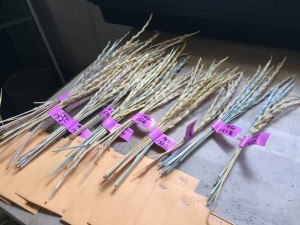Austin College Environmental Studies Summer Internships
The Austin College Center for Environmental Studies offers competitive summer internships with outstanding environmental organizations that each offer an opportunity to spend part of your summer with a small but nationally known organization that is a recognized leader in its field.
The 2024 application submission deadline is Friday, February 23.
The internship placements are designed to provide a broader perspective on potential environmental careers, a better understanding of the roles and impacts of environmental professionals, a deeper appreciation for the potential of an individual to make a difference, and a unique summer experience that previous interns have found to be both enjoyable and rewarding for their futures in the world of environmental studies.
All Austin College students are eligible to apply for these internships. Any student considering applying should contact Rebecca Jones (x2034) at their earliest opportunity. Internships are typically eight weeks with stipends of $4,500. Host organizations may prefer 6 or 10 week internships, in which cases the same weekly rate of pay applies. Housing is provided at all three internship sites.
In order to ensure a stimulating and engaging experience, we’ve partnered only with excellent but small host organizations to allow interns to interact closely and thoughtfully with key staff members. We encourage you to learn more about each organization and their focus by reading the following descriptions and studying the organizations’ websites.
| Site | Location | Emphasis | Duration |
| The Land Institute | Salina, Kansas | Sustainable agriculture | 8-10 weeks |
| The Little Traverse Conservancy | Harbor Springs, Michigan | Land preservation | 8-10 weeks |
| The East Foundation | Jim Hogg County, Texas | Rangeland management & conservation | 8-10 weeks |
ROLES OF INTERNS
The Role of Interns at The Land Institute
Student interns gain valuable insight into the perennial grain crop research of The Land Institute. One of the major problems of modern agriculture is that humans get ½ of their calories from annual crops that must be replanted each year (corn, wheat, and rice). The necessary plowing causes tremendous soil erosion, and the fragile seedlings requires huge inputs of fertilizer, pesticides, and energy to fuel tractors. Meanwhile, the shallow-rooted annual grasses are highly sensitive to droughts. If grains instead grew as perennials the annual plowing and planting would become unnecessary and the plants could develop deep roots that impart drought resistance. The Land Institute is the world leader in the brilliant goal of developing perennial crops.
Field work includes sampling, transplanting, and weeding. Interns also participate in seminars with staff and visiting scientists; however, the majority of learning is gained by assisting with the hands-on work of the research programs. While the field work is satisfying, it can also be repetitive and challenging in terms of physical work in hot, dry, and sometimes windy conditions.
Plant Breeding: The Land Institute is trying to develop an agriculture based on perennial grains by: 1) crossing annual crops with perennials, to either bring crop-quality traits to the perennials, or breeding perennialism into the annuals; and 2) domesticating wild perennials. Interns help with hoeing weeds, planting, harvesting, threshing, data collection in the field and laboratory, and data entry. This research, like most scientific research, can be highly repetitive. But most interns have found deep satisfaction in being part of a large, long-term project that aims to transform the way people farm all around the world.
Agro-Ecological Experiments: Several questions are being addressed through experiments that vary plant diversity and functional groups in farm-like systems where multiple species are planted together. For example, experiments that plot perennial grains and legumes together seek to determine the extent to which nitrogen can be supplied to perennial grains as a result of the nitrogen fixation of the legumes. Other plots compare native prairie productivity with that of annual and perennial grains.
The Role of Interns at The Little Traverse Conservancy

Interns spend much of their time helping with preserve stewardship — tending properties the LTC owns and manages for the public, but they may also assist the education department. Tasks can be labor intensive in a variety of weather conditions and include: trail maintenance, mowing, boardwalk construction, ecological restoration, vegetation management, and resource assessment.
The Role of Interns at The East Foundation
Austin College summer interns will focus on collecting and managing vegetation data for East Foundation ranches, mainly within an 18,000-acre experimental grazing study.
Working with the range ecology crew, student interns help collect data on forage utilization, forage standing crop, vegetation structure, vegetation and ground cover and vegetation composition, while gaining experience with grazing exclosures, double sampling, and transects with quadrats to collect data. The intern will also be responsible for entering all data into an electronic format and ensuring data quality and accuracy. Additionally, student interns have the opportunity learn to use Vegetation GIS Data System software for data collection. Training in South Texas plant identification (grass, forbs, shrubs) will be provided.
COMMENTS FROM FORMER INTERNS
Kellie Wilcox - The Little Traverse Conservancy
“I strongly recommend the internship at the Little Traverse Conservancy. I could not have asked for nicer people, better mentors, or more enjoyable work.
"My two months in Michigan were, without exaggeration, two of the best months of my life. First of all, Northern Michigan is absolutely beautiful… it really is one of the prettiest areas I’ve ever been to. If you love being outdoors then northern Michigan in the summer is a paradise on earth.
“Working at LTC was a great experience, the whole staff is friendly, welcoming and helpful and I made some really good friends. The director, Tom Bailey, is renowned across the country for his work in land conservation and he really is an inspiring person.
”I worked on the Stewardship crew of the organization… About half my time was spent in the office… working on management plans, maps, and a profile of Emmet County. The rest of my time was spent outside marking and clearing trails, constructing and installing signs, and walking preserve boundaries. I also went out on a few children’s programs with the Environmental Education crew. I loved that I got to work outside so much…”
Nicole Gentili - The Land Institute
"I learned more about myself than I ever thought was possible. I truly loved this internship, not just for the experience I received working at The Land Institute, but for the wonderful people I met along the way. The other interns taught me so much about how to enjoy the little things, be happy for what you have, learn every chance you can get, and to not settle. Going into this internship I knew nothing about agriculture except the impacts it had on the environment from the environmental class I had taken. Now I feel as though I know most of the ins and outs of how perennial agriculture works.
"Perennial agriculture is the future of agriculture and I am completely honored to have had the chance to work with such renowned scientists. I assisted with collecting data on Kernza, weeding, harvesting, and seed counting. The experiences, knowledge, and life long friends I have gained at the Land Institute are priceless."
RESPONSIBILITIES OF INTERNS
- Hard, diligent, conscientious, full-time work at the host organization for the entire length of the internship. Interns should set an example that will make their host organization eager to welcome future Austin College students.
- Transportation to, from, and at the site. At all three sites it is helpful if you have your own vehicle, but note that The Little Traverse Conservancy does not require a vehicle and can provide you with a bike or other vehicle for short trips.
- Housing is provided at all three locations.
- Please discuss housing options with the coordinator when you first inquire about these internships.
- You will be responsible for a number of things once your internship is over, including a lunch forum presentation as well as a thank you letter to the donor who funded your internship. See bottom of page for details.
APPLICATION PROCEDURE, DEADLINES AND CRITERIA
If you have any questions about the internships, the application procedure, or anything else that may be holding you back from applying, please consult Rebecca Jones at your earliest convenience.
CRITERIA FOR SELECTING NOMINEES TO HOST ORGANIZATIONS
- Evidence of interest in environmental studies
- Enthusiasm for the internship opportunity
- Two written statements (see below)
- Academic record
- Recommenders’ comments regarding academic qualifications and personal characteristics
- Any interviews with environmental studies faculty or (over the phone) host organization staff
- There is a limit of one intern per host organization
- Seniority - In other words, if a junior and a first-year student both apply for an internship and both are well qualified, we nominate the older applicant because they will not have another opportunity. However, first-year students and sophomores should apply and many have held internships.
APPLICATION MATERIALS TO BE SUBMITTED
Submit the following materials to Rebecca Jones as an attachment to an email message. Please include both the questions and your answers for ease of reading:
- Name
- Ranking of the host organizations based on your preferences
- Complete mailing address
- An email address that you check daily or almost daily
- Telephone number(s) where you can be reached
- Your anticipated date of graduation
- Your major(s) or anticipated major(s)
- Any minor or anticipated minor
- Names of two Austin College faculty members who can comment meaningfully on your academic and personal qualifications (You need not request a letter from these individuals.)
- Written statement #1: Provide a specific and thoughtful description of the nature of your interest in environmental studies. (300 word limit)
- Written statement #2. Describe how you decided to rank the host organizations. Explain your understanding of the goals of your preferred host organization and how they relate to your own goals, values, career interests, and interest in environmental studies. (300 word limit)
Note: Those who are selected will need to complete a standard college application for employment. You do not need to submit this document with your initial application. If you are not a U.S. citizen you should check with the Human Resources office (AD 211) to confirm your eligibility for employment.
APPLICATION TIMELINE
- Friday, February 23 – Application materials are due.
- Friday, March 1 – Environmental Studies Committee nominate candidates to host organizations and notify applicants of decisions.
- Wednesday, March 6 – Deadline for applicant to complete a phone interview with the host organization.
- Friday, March 8 – Applicants notified of the final decisions.
- Friday, March 16 – Applicants asked to confirm their commitment.
- Follow up plans and procedures (housing, payment procedures, transportation, etc) completed by Friday, March 29. Internship Evaluation Forms will be emailed to interns by this date.
POST-INTERNSHIP REQUIREMENTS
A presentation on your internship during a fall semester Environmental Studies Lunch Forum is required. The presentation should describe the role of the organization, your role as an intern, and what you gained from the opportunity. Two practice sessions with Dr. Keith Kisselle should be scheduled prior to your presentation. Additionally, a letter written to the donor who funds these internships describing your internship and how it was valuable to you is also required. We also ask that you complete an Internship Evaluation Form.
We strongly encourage you to begin working on both the presentation and letter before you return to campus for the fall semester. Past interns have told us that they regretted waiting to start on their presentations and letters, as they got busy with classes and it made for a more stressful experience. The Internship Evaluation Form is intended to prompt some reflection and should be helpful as you work on both your presentation and your letter.
- Friday, September 6 – Deadline for turning in your Intern Evaluation Form and contacting Rebecca Jones regarding your Lunch Forum presentation. Pictures from your internship due to the Coordinator for Lunch Forum publicity purposes (three or four are sufficient).
- Monday, September 9 – Deadline for mailing a thank you letter to the donor who funded the internship (email Dr. Peter Schulze to confirm you have sent the letter).

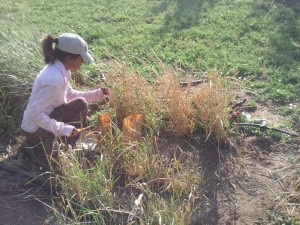
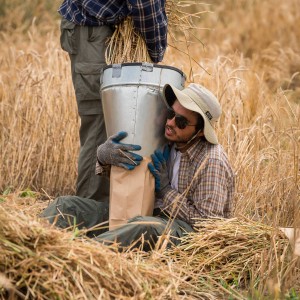
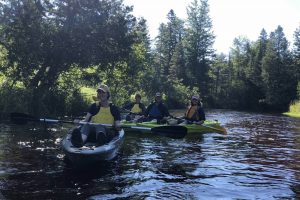
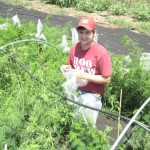
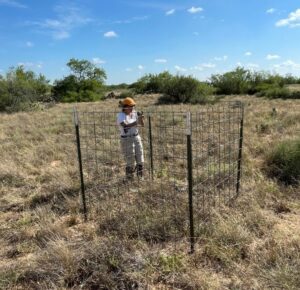
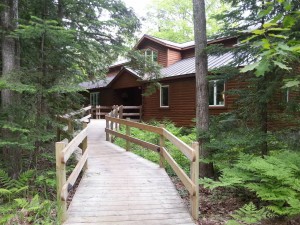 “I strongly recommend the internship at the Little Traverse Conservancy. I could not have asked for nicer people, better mentors, or more enjoyable work.
“I strongly recommend the internship at the Little Traverse Conservancy. I could not have asked for nicer people, better mentors, or more enjoyable work.